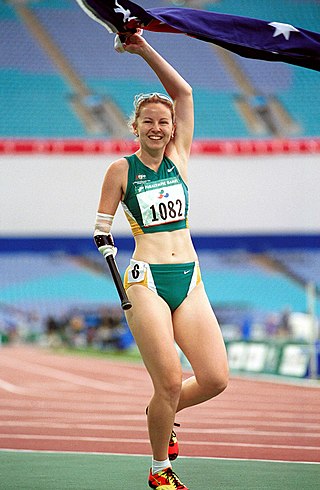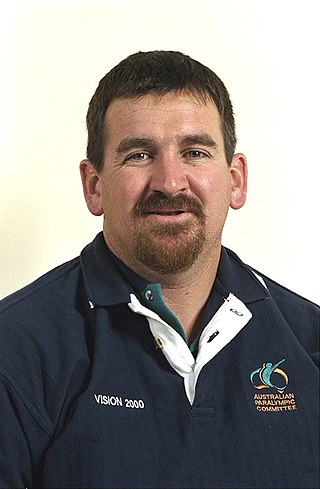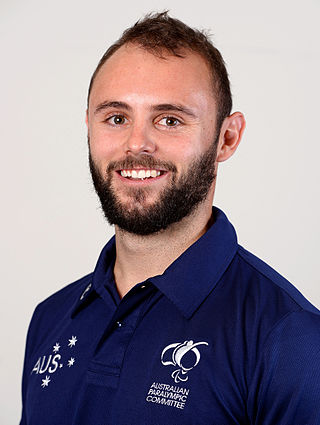
Australia has competed in every Winter Paralympics. In 1976, the first Games, Australia's sole competitor was Ron Finneran, but he was not an official entrant. In 1980, Kyrra Grunnsund and Peter Rickards became the first official competitors, in alpine and cross-country skiing. The number of Australian athletes increased to three, five, five and six at the next four games, respectively, and all of the athletes were alpine skiers. The participation decreased to four in 1998 and climbed back up to six in 2002. Australia won its first Winter Paralympic medals in 1992, and has medalled at every games since then. All of the medals have been won in alpine skiing.

Brad Scott is a Paralympian track and field athlete from Australia competing mainly in category T37 middle-distance events. He represented Australia at the three Paralympics - 2008 to 2016 in athletics and won two silver and one bronze medals.
Paralympics Australia (PA) previously called the Australian Paralympic Committee (APC) (1998–2019) is the National Paralympic Committee in Australia for the Paralympic Games movement. It oversees the preparation and management of Australian teams that participate at the Summer Paralympics and the Winter Paralympics.

Australia competed at the 2012 Summer Paralympics Games in London, United Kingdom, from 29 August to 9 September 2012. The London Games were the biggest Games with 164 nations participating, 19 more than in the 2008 Beijing Paralympic. Australia has participated at every Summer Paralympic Games and hosted the 2000 Sydney Games. As such, the 2000 Sydney Games, regarded as one of the more successful Games, became a point-of-reference and an inspiration in the development of the 2012 London Games.

John Desmond Eden is a leg-amputee athlete and Australian and New Zealand Paralympian.

Amy Louise Winters, OAM is an arm amputee Australian Paralympic athlete. She won seven medals at three Paralympic Games, including five gold medals.

Australia competed at the 1992 Paralympic Games in Barcelona for physically and vision-impaired athletes. Immediately after the Barcelona Games, the city of Madrid held events for athletes with an intellectual disability. The Madrid results are not included in International Paralympic Committee Historical Results Database. Australia finished 7th in the total medal count winning 76 medals. Australia competed in 13 sports and won medals in 3 sports – swimming, athletics and weightlifting. Australia finished first in the medal tally at the 1992 Paralympic Games for Persons with Mental Handicap in Madrid.

David Martin Evans, OAM is an Australian Paralympic athlete. He is an arm amputee, and his nickname was 'Clock'.

Hamish Anderson MacDonald, OAM is an Australian Paralympic athlete. He was born in Melbourne and lives in Canberra. He has cerebral palsy. His achievements and advocacy have made him one of Australia's most respected Paralympians.
Karl Peter Thomas Feifar, OAM was an indigenous Australian amputee athlete and Paralympic competitor.
Rodney Francis Nugent, OAM is an Australian Paralympic athlete.

Sam Rickard is an Australian vision impaired Paralympic athlete. He competed in four successive Paralympic Games 1988 to 2000, winning a bronze medal at the 1992 Barcelona Games. His nickname was 'the Sparrow'.

Scott William Goodman is a leading Australian Paralympic athletics coach and sports administrator.

Anton James Flavel, OAM is an Australian athlete with an intellectual disability. He was born in the Western Australian town of Narrogin. In his disability class he held a world record for the javelin and an Australian record in the shot put and high jump.

Ramon (Ray) Gary Epstein, is an Australian Paralympic weightlifter and powerlifting coach. He represented Australia in weightlifting at the 1988 Seoul and 1992 Barcelona Paralympics and was Head Coach of the Australian Paralympic powerlifting team between 2003 and 2013.

Damien Bowen is an Australian seated shot putter and seated javelin thrower. He represented Australia in athletics at the 2012 Summer Paralympics but did not medal.

Scott Peter Reardon, is an Australian Paralympic leg amputee sprinter and water skier. He won water skiing world championships in 2007 and 2009. He represented Australia at the 2012 Summer Paralympics in athletics, winning a silver medal in the Men's 100 m T42. At the 2016 Rio Paralympics, he went one placing better to win the gold medal. Reardon has won the Men's 100 m T42 in three consecutive World Para Athletics Championships, from 2013 to 2017. He competed at the 2020 Tokyo Paralympics, his third games.
Disabled Wintersport Australia (DWA) was established in 1978 as the Australian Disabled Skiers Federation. Its current mission is "to promote and foster the advancement of participation by people with a disability in wintersport both in Australia and overseas". DWA is a member of the Australian Paralympic Committee. DWA plays a major role in the development of Australian athletes that compete at the Winter Paralympics.

Jayden Sawyer is an Australian para athlete who competes mainly in the F38 category in throwing events. He won has won gold and bronze medals at the World Para Athletics Championships. He competed at the 2016 Rio and 2020 Tokyo Summer Paralympics.

Jennifer Patricia Banks OAM is an Australian athletics coach specialising with Paralympic wheelchair athletes.
















